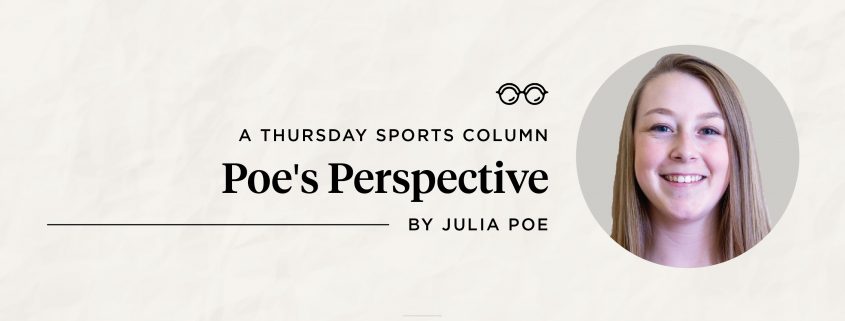Poe’s Perspective: Proposed bill presents paying college athletes as a future possibility
On one of the most important days in college athletics, California State Sen. Nancy Skinner formally inked a proposition that could fundamentally change the way that people view college athletes.
Skinner submitted Senate Bill 206 — the “Fair Pay to Play Act” — on Wednesday. Wednesday was also National Signing Day, when hundreds of thousands of athletes sign their lives away to universities across the country. Her goal is to allow athletes to receive compensation for their work as athletes, forcing California head-on into a heated national debate over athlete pay and the concept of “amateurism” in college sports.
Skinner’s bill, however, makes a distinction. Instead of requiring universities to provide paychecks along with scholarships, it creates a provision that allows athletes to receive outside payments that were previously banned under NCAA policies. If the bill is passed, college athletes in California could soon sell endorsements, jerseys, autographs, workshops and more for profit without losing their scholarships.
This bill is a vital step forward for college athletes, marking the beginning of a necessary, full-on war between legislators and the NCAA.
Simply put, the college sports industry as it currently stands is a cartel. The NCAA has a chokehold on all opportunities for talented athletes early in their career; if an athlete wants to make it in the NFL or NBA, they have to spend one to three years in the NCAA first. And in those years, they only receive payment in form of grant-in-aid, a scholarship for an education that is watered down and often worth less than what these athletes contribute to their athletic department’s annual revenue.
Although there are still those who defend the supposed “purity” of amateurism in the NCAA, the vast majority of the country is beginning to realize the inequality of the college sports industry. Coaches and schools are making millions off the back of unpaid labor, and the facade of a “free education” is beginning to wear thin in light of continuous scandals.
While a general consensus that something should be done about the status quo is becoming inevitable, the real difficulty comes in crafting a solution. Which players do you pay? Stars? Starters? Those who generate revenue? Many argue it isn’t fair to pay athletes in revenue-generating sports and not others who work just as hard in track and field or lacrosse. Others point out the difficulty in creating a sliding-scale model for player compensation based on playing time or team impact.
What Skinner has proposed, however, is an important change that side-steps the issue of university compensation. This bill would not force universities to pay their athletes; instead, it would simply remove limitations that previously prohibited athletes from making any sort of outside income.
Those prohibitions are, in my opinion, the absolute worst part of the NCAA’s war on player compensation. To completely protect the so-called amateurism of its athletes, the NCAA prohibits athletes from using their own likenesses for profit.
Quite literally, athletes don’t have autonomy over their own names and images. While their universities sell jerseys inscribed with their numbers and use their faces to sell out stadiums, players are prohibited from even selling autographs. Skinner’s law gives athletes the right to their own identity, allowing them to at the least make a living off of their own skills.
For a state boasting four Pac-12 schools, the California senate needs to pass this bill. It would benefit more than just a state full of players who deserve more than tuition for their efforts as student athletes. This bill has the ability to topple perhaps the most ludicrous aspect of the current lack of player compensation, and it could at least set a precedent for a nationwide conversation regarding how we treat college athletes.
It would inevitably garner major backlash from the NCAA, which as a national organization would no doubt lash out over any attempt at interference from a state government. But this would only formally set the stage for a future legal conversation at both the state and national level about player compensation, something that has failed time and time again, most recently in the O’Bannon v. NCAA case.
The battle to give NCAA athletes full rights to their own compensation will be a long and brutal one, and a single bill won’t solve all of its problems. However, Skinner’s bill marks a vital step toward the future, and its passing could begin to forge a new era of autonomy for student athletes.
Julia Poe is a senior writing about her personal connection to sports. Her column, “Poe’s Perspective,” runs weekly on Thursdays.

